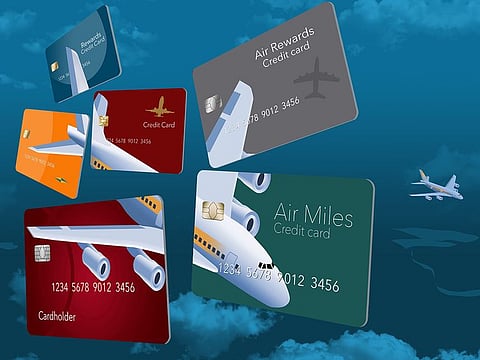Who is actually paying for a wealthy credit card user's free travel in Business class?
Points and air miles won on credit card usage comes at a price, but someone else is paying

Amalfi in April.
Madeira in May.
Johannesburg in June.
I have a friend, a successful business owner in Dubai, who travels every month to different destinations for exotic holidays with his wife. He books his flights in Business class - for free - using his credit card reward points.
So, who is paying? His credit card issuer – one of the big banks in the country.
There are over 5 million credit cards in circulation in the UAE, with total annual spending expected to reach Dh300 billion this year. Spending is growing at an unprecedented 30 per cent per annum, partly fuelled by generous reward points and partly by post-Covid revenge spending, with travel and grocery being the two fastest-growing sectors.
What is more surprising is the increased volume of issuance of new cards – nearly 80,000 new credit cards are issued by UAE banks every month, though the ‘card-able’ population is growing at a much lower pace. This indicates more people are signing up for multiple cards.
An industry on steroids
Clearly, the credit card industry is on steroids. There are over 25 card issuers and they issue a variety of credit cards – plain vanilla cards, cash-back cards and co-branded cards with retailers, airlines, and hotels. Roughly half of all cardholders are what are called ‘revolvers’ – people who carry forward their monthly dues to be paid in installments with interest. The rest are ‘transactors’, typically more affluent customers, who pay off their entire dues every month. According to a recent McKinsey study, revolvers contribute over 80 per cent of revenues that banks make from credit cards.
Total credit card debt is estimated to be Dh40 billion in UAE with loss rates inching up to 8 per cent in the last quarter. Not a big concern for the industry though, since most banks charge a whopping 44 per cent per annum on credit card debt. And interest margins are around 15 per cent, the highest for any bank product globally and enough to comfortably absorb bad debts of up to 10 per cent.
No wonder then that the consumer businesses for most banks are recording double-digit revenue growth.
Who pays the price?
Clearly, the credit card revolver, typically a medium-income expatriate professional, trying to ‘live up’ beyond their monthly earning by dipping into credit card debt. Multi-carding through aggressive sales tactics by banks compounds the problem and vulnerable customers sign up for 2 or more cards to ratchet up debt.
As a banker, I have dealt with many such customers. A secretary in a trading company, for example – a single mother with credit card outstanding that added up to twice her annual salary. Or an airline pilot who had 6 credit cards with a total debt of over Dh1 million that the bank had to restructure.
The sad fact in all these cases is that the principal outstanding is always relatively small, with the compounded interest component typically making up 80 per cent of the debt.
Reward cards add to the issue. These are cards that reward you through cash back, airline miles, or loyalty points. About 8 in 10 credit cards in UAE are reward cards that encourage you to spend more and more. The affluent transactors move all their expenditure to such cards and earn thousands of airline miles that they trade for free Business class tickets.
The not-so-affluent cardholders, typically revolvers, also get incentivised to spend more, but before they can enjoy the rewards, get caught up in a debt spiral that leads to financial distress.
'Reverse Robin Hood' mechanism
In a recent paper for the US Federal Reserve Board, a team of researchers concluded that sophisticated individuals profit from reward credit cards at the expense of naïve consumers. They called it the ‘reverse Robin Hood’ mechanism where the poor subsidise the rich, and estimated an aggregate annual redistribution of $15 billion in the US from less to more educated and poorer to richer. We do not currently know this number for the UAE, but it is bound to be substantial.
What is the way forward? Customers have to become more careful before signing up for more credit cards or limit increases. Banks have to be more responsible in the financial education of cardholders. The regulator already mandates limits for debt burden ratios and might have to consider interest rate caps in the future to protect consumers.
Meanwhile, my footloose friend has already booked his next holiday travel in August to Argentina. Using his credit card reward points, of course.
Sign up for the Daily Briefing
Get the latest news and updates straight to your inbox




